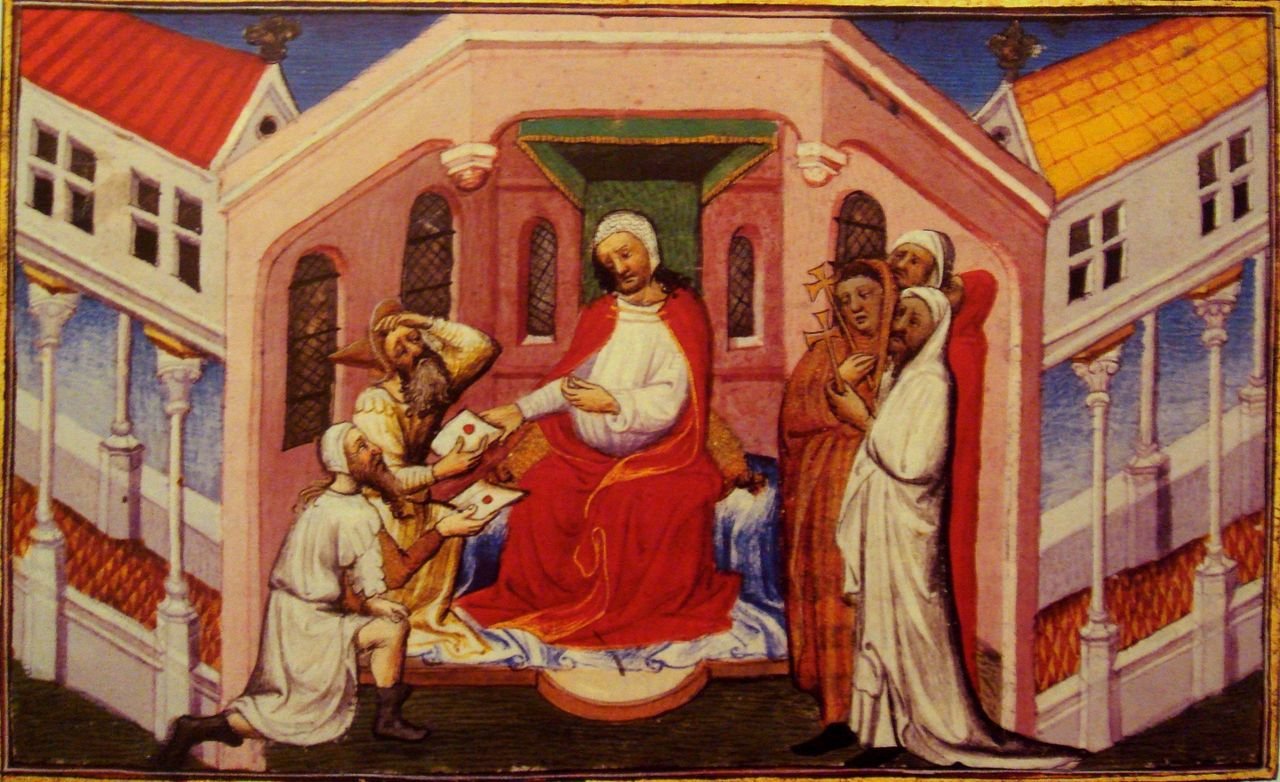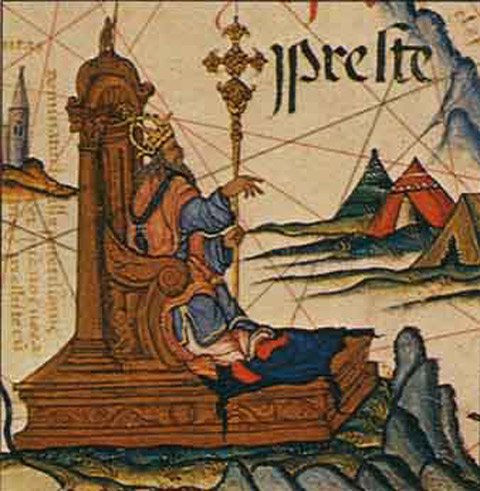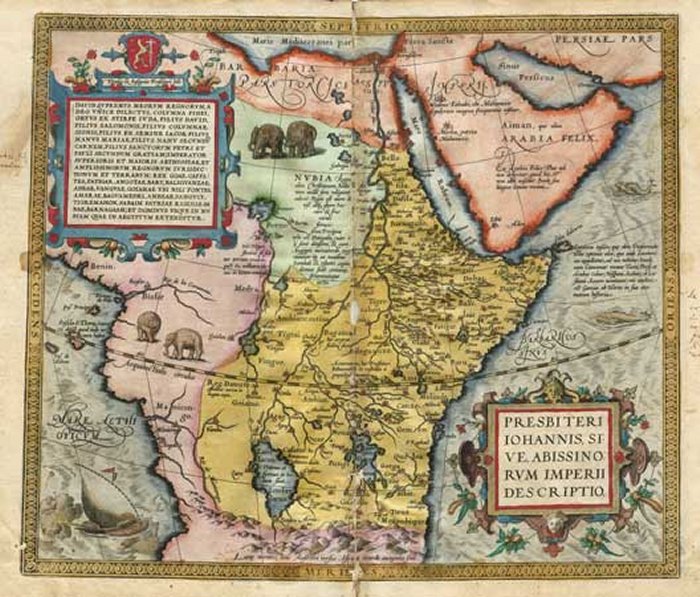Mythical Kingdom Of Prester John – Did It Exist?
Ellen Lloyd - AncientPages.com - The legend of Prester John arose during the period of the Crusades when European Christians hoped to regain the Holy Land (Palestine) from the Muslims.
Prester John was said to be a wealthy Christian king and priest with a kingdom located somewhere outside of the Western European realm. With limited access to proper maps and many still unexplored places, there was great confusion about where his powerful kingdom was located.
Depiction of the Keraite ruler Ong Khan as "Prester John" in "Le Livre des Merveilles", 15th century. Credit: Public Domain
During the Middle Ages, people thought the legendary kingdom of Prester John was in the Far East, India, and, finally, the interior of Africa.
Did the mythical kingdom of Prester John really exist?
The story of Prester John was first mentioned by Bishop Otto of Freising in his Chronicon (1145). According to the bishop, Prester John was a rich king, priest, and a lineal descendant of the Magi who had visited the Christ child. It was believed that the great king ruled over a kingdom full of riches, marvels, and strange creatures.
Bishop Otto of Freising had learned about the story from Bishop Hugh of Jabala in Syria. Hugh was an emissary of Prince Raymond of Antioch seeking Western aid against the Saracens after the Siege of Edessa, and his counsel incited Eugene to call for the Second Crusade. He told Otto, in the presence of the Pope, that Prester John, a Nestorian Christian who served in the dual position of priest and king, had regained the city of Ecbatana from the brother monarchs of Medes and Persia, the Samiardi, in a great battle "not many years ago." Afterward, Prester John allegedly set out for Jerusalem to rescue the Holy Land, but the swollen waters of the Tigris compelled him to return to his own country.
Nothing more about Prester John and his kingdom were heard of for many years, not until about 1165 when copies of what scholars believe to be a forged Letter of Prester John started spreading throughout Europe.
Preste" as the Emperor of Ethiopia, enthroned on a map of East Africa in an atlas prepared by the Portuguese for Queen Mary, 1558. (British Library)
This particular letter was supposedly written to the Byzantine Emperor Manuel I Comnenus (1143–1180) by Prester John, the descendant of one of the Three Magi and King of India.
Europeans became fascinated with the many marvels of richness and magic of Prester's kingdom associated with peace and justice administered by a court of archbishops, priors, and kings. The letter also stated that Prester John was the guardian of the shrine of St. Thomas, the apostle to India, at Mylapore, India. It did not take long before the letter was translated into numerous languages, including Hebrew. With the invention of printing, the letter and story of Prester John became even more widespread.
Part of the letter's essence was that a lost kingdom of Nestorian Christians still existed in the vastness of Central Asia.
The credence given to the reports was that Pope Alexander III sent a letter to Prester John via his physician Philip on September 27, 1177. Nothing more is recorded of Philip, but it is most probable that he did not return with a word from Prester John.
Unfortunately, the fate of the letter is unknown.
The Mongol Empire's rise gave Western Christians the opportunity to visit lands they had never seen before, and they set out in large numbers along the Empire's secure roads. The belief that a lost Nestorian kingdom existed in the east, or that the Crusader states' salvation depended on an alliance with an Eastern monarch was one reason for the numerous Christian ambassadors and missionaries sent to the Mongols.
1603 Dutch Map Showing the Kingdom of Prester John in East Africa. Credit: Public Domain
So, was the entire story of mythical Prester John really true? Many searched for the legendary kingdom. These include Franciscan explorers Giovanni da Pian del Carpine in 1245, William of Rubruck in 1253, and even Marco Polo, but none of them could locate the place. After the mid-14th century, explorers concentrated on Ethiopia. The kingdom of Prester John was identified with the negus (emperor) of that African Christian nation, but once again, the kingdom could not be found.
According to the legend, this remarkable kingdom was somewhere in Asia. Maybe we will find ancient ruins that can be linked to the mythical kingdom one day. It is also possible this place never existed.
The emergence of the legend coincided with the first Crusades of European armies into the Near East. The legend then seems to indicate a hope for a powerful kingdom that could serve as an ally in the European campaign to recapture Jerusalem.
Written by Ellen Lloyd – AncientPages.com
Copyright © AncientPages.com All rights reserved. This material may not be published, broadcast, rewritten or redistributed in whole or part without the express written permission of AncientPages.com
Expand for referencesMore From Ancient Pages
-
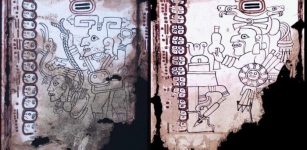 Grolier Codex – Oldest, Unique, Genuine Pre-Columbian Maya Manuscript That Survived Spanish Inquisition
Artifacts | Jan 20, 2018
Grolier Codex – Oldest, Unique, Genuine Pre-Columbian Maya Manuscript That Survived Spanish Inquisition
Artifacts | Jan 20, 2018 -
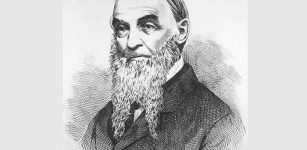 On This Day In History: Independence Of Lower Canada – Today Quebec – Proclaimed On Feb 28, 1838
News | Feb 28, 2017
On This Day In History: Independence Of Lower Canada – Today Quebec – Proclaimed On Feb 28, 1838
News | Feb 28, 2017 -
 Extraordinary Viking Boat Burial Of Two People Unearthed In Central Norway
Archaeology | Nov 20, 2019
Extraordinary Viking Boat Burial Of Two People Unearthed In Central Norway
Archaeology | Nov 20, 2019 -
 Cave Of The Stone Sepulcher – ‘Actun Tunichil Muknal’ And Its Dark History
Featured Stories | Mar 22, 2019
Cave Of The Stone Sepulcher – ‘Actun Tunichil Muknal’ And Its Dark History
Featured Stories | Mar 22, 2019 -
 7,000-Year-Old Kilns From Ceramics Workshop Unearthed In Northeast Bulgaria
Archaeology | Nov 20, 2020
7,000-Year-Old Kilns From Ceramics Workshop Unearthed In Northeast Bulgaria
Archaeology | Nov 20, 2020 -
 What Is The Avoidance Custom Of The Amish People In Pennsylvania?
Ancient History Facts | Jul 29, 2019
What Is The Avoidance Custom Of The Amish People In Pennsylvania?
Ancient History Facts | Jul 29, 2019 -
 Ji Gong: Legendary Ancient Monk Who Defended People Against Injustice
Chinese Mythology | Jan 31, 2016
Ji Gong: Legendary Ancient Monk Who Defended People Against Injustice
Chinese Mythology | Jan 31, 2016 -
 Strange And Unexplained Events In Transylvania – One Of The Most Mysterious Places In Europe
Featured Stories | Jan 6, 2022
Strange And Unexplained Events In Transylvania – One Of The Most Mysterious Places In Europe
Featured Stories | Jan 6, 2022 -
 Ancient Atlantean Sculpture Discovered At The Mayan Chichen Itza Archaeological Site
Archaeology | Aug 29, 2023
Ancient Atlantean Sculpture Discovered At The Mayan Chichen Itza Archaeological Site
Archaeology | Aug 29, 2023 -
 The Truth About Ancient Rome’s Vomitorium
Featured Stories | Jun 18, 2019
The Truth About Ancient Rome’s Vomitorium
Featured Stories | Jun 18, 2019 -
 Mystery Of Monte d’Accoddi: Was It An Ancient Step Pyramid, Altar Or Astronomical Observatory?
Civilizations | May 17, 2016
Mystery Of Monte d’Accoddi: Was It An Ancient Step Pyramid, Altar Or Astronomical Observatory?
Civilizations | May 17, 2016 -
 Dionysus – Greek God Of Wine, Music, Ritual Madness And Ecstasy Was Born Twice
Featured Stories | Jan 8, 2019
Dionysus – Greek God Of Wine, Music, Ritual Madness And Ecstasy Was Born Twice
Featured Stories | Jan 8, 2019 -
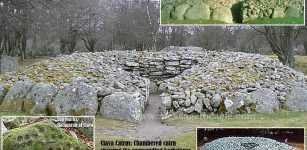 4,000-Year-Old Scottish Clava Cairns Were Built To House Dead
Civilizations | Nov 27, 2018
4,000-Year-Old Scottish Clava Cairns Were Built To House Dead
Civilizations | Nov 27, 2018 -
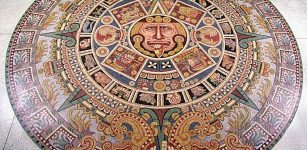 Aztecs’ Five Suns Creation Myth And Prophecy
Aztec Mythology | Jul 18, 2018
Aztecs’ Five Suns Creation Myth And Prophecy
Aztec Mythology | Jul 18, 2018 -
 Ephemeral Evidence Of Mediterranean Mobility – Boats, Migration, And The Central Mediterranean Passage In Focus
Archaeology | Dec 23, 2021
Ephemeral Evidence Of Mediterranean Mobility – Boats, Migration, And The Central Mediterranean Passage In Focus
Archaeology | Dec 23, 2021 -
 1,000-Year-Old Bone Skate Found In Moravian City Of Přerov, Czech Republic
Archaeology | Mar 20, 2024
1,000-Year-Old Bone Skate Found In Moravian City Of Přerov, Czech Republic
Archaeology | Mar 20, 2024 -
 Declining Fertility Rates May Explain Neanderthal Extinction
Archaeology | Jun 3, 2019
Declining Fertility Rates May Explain Neanderthal Extinction
Archaeology | Jun 3, 2019 -
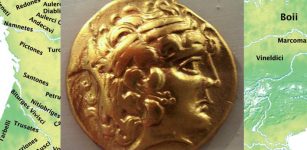 Cenomani People: Their Pre-Roman Celtic Cemetery Reveals Funerary Customs
Archaeology | Apr 18, 2019
Cenomani People: Their Pre-Roman Celtic Cemetery Reveals Funerary Customs
Archaeology | Apr 18, 2019 -
 Ancient Sound Of Stones – Acoustics At Stonehenge Tested By Scientists
Ancient Technology | Aug 29, 2020
Ancient Sound Of Stones – Acoustics At Stonehenge Tested By Scientists
Ancient Technology | Aug 29, 2020 -
 Pliska: Ancient City Ahead Of Its Time With Secret Underground Tunnels, Sewage And Heating Systems
Featured Stories | May 22, 2017
Pliska: Ancient City Ahead Of Its Time With Secret Underground Tunnels, Sewage And Heating Systems
Featured Stories | May 22, 2017

